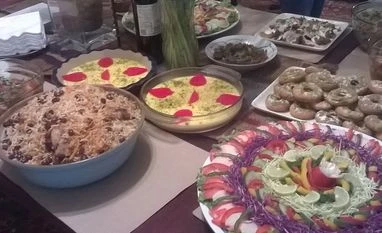Between the first and second waves of the pandemic in India, when restaurants and hospitality establishments opened up for the public, many would have noticed traditional menus giving way to QR code-based fare. The concept is simple-scan the QR code on your table or in your hotel room with your phone camera, and it will take you to a link where all the available options are listed.
Going contact-less in e-commerce deliveries, payments, and even food ordering is no longer a choice. Powering this simple-to-use but necessary QR code-based food ordering is a little known firm in Pune called Airmenus, which has over 400 clients including notable ones such as Hyatt Regency, Double Tree by Hilton, Yazu Goa, Jamun in Delhi, and several others.
Built on Amazon Web Services cloud, the solution powers more than 400 restaurant and other business menus, said Gaurav Charnalia, Chief Technology Officer, a full-stack developer who has previously worked with Cognizant.
Luvin Paryani, one of the three co-founders who is also the Head of Business and comes from a hospitality background, felt Indian food establishments were stuck with paper menus that weren't intuitive, were non-engaging and came with high design and printing costs. His solution? An engaging, photo-based menu, with pictures of the food on offer, would take care of all these shortcomings and also be easier to update and access, he reasoned.
But then, the pandemic and lockdowns happened in March. Wending its way through the lockdown, Airmenus got to work. "By August, we had some sort of product with us with the static manual scan. Then we pivoted to the takeaway, delivery aspect of restaurants. We built out a version in a month, under which once a restaurant has a link, it can create its own website, which it can share with customers," says Paryani.
From August last year to now, Airmenus has managed to onboard hotels, restaurants, home chefs, gourmet stores all over the country, and several craft breweries in Maharashtra.
A QR code is a type of barcode that can be read easily by a digital device and which stores information as a series of pixels in a square-shaped grid. QR codes are frequently used to track information about products in a supply chain and – because many smartphones have built-in QR readers – they are often used in marketing and advertising campaigns. More recently, they have played a key role in helping to trace coronavirus exposure and slow the spread of the virus, explains Kaspersky.
The product Airmenus offers is not just QR code for food menus, but also doubles up as a contact-tracing app.
"When you scan the QR, you'll receive a guest register where you need to fill in your phone number and name. In case something goes wrong, there's always a way that restaurants will know a person had dined with them. And this has helped them in a lot of scenarios. So that was great for us, where we were the first ones who pivoted into digitalizing the whole contact-tracing experience," said Paryani.
"One of the major problems that came across while talking to restaurants was the high commissions the aggregators charge with every order. While talking to them we figured that they really, really need a platform for direct orders," said Parikshit Goenka, the product head at Airmenus, who has worked as a data scientist at AB InBev and AgroStar.
Food aggregators like Swiggy and Zomato charge restaurants anywhere between 25-30 per cent as commission, an issue that has been hurting the sector for a while. Many establishments are looking to encourage direct ordering from their websites, and this is another area where Airmenus helps clients.
Airmenus charges a fixed subscription as opposed to a commission on every order, making it easier for restaurants to plan their expenses. "We don't charge commission on any orders, we only charge a fixed monthly fee. And the fee varies between Rs 800 to 1200, irrespective of the business. So even if you do say Rs 1000 in business or a lakh or ten lakh in business in a month, we will charge you the same fixed amount," said Paryani.
In addition, the food establishments get access to data from dine-ins, delivery and take-away orders.
The startup is currently bootstrapped and expects to take the product to all parts of the country. The founders expect to raise fund but only if the investor adds value to the company.
Unlock 30+ premium stories daily hand-picked by our editors, across devices on browser and app.
Pick your 5 favourite companies, get a daily email with all news updates on them.
Full access to our intuitive epaper - clip, save, share articles from any device; newspaper archives from 2006.
Preferential invites to Business Standard events.
Curated newsletters on markets, personal finance, policy & politics, start-ups, technology, and more.
)